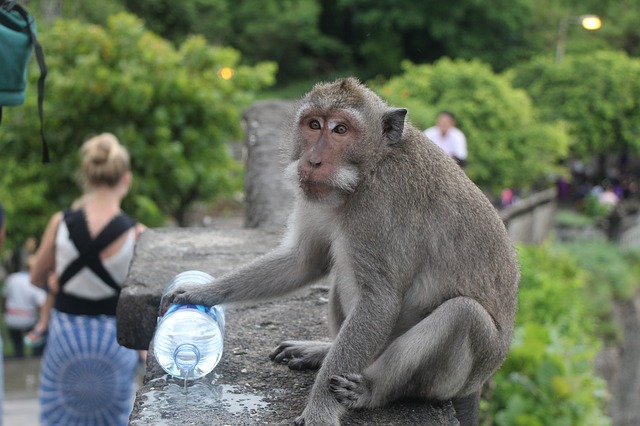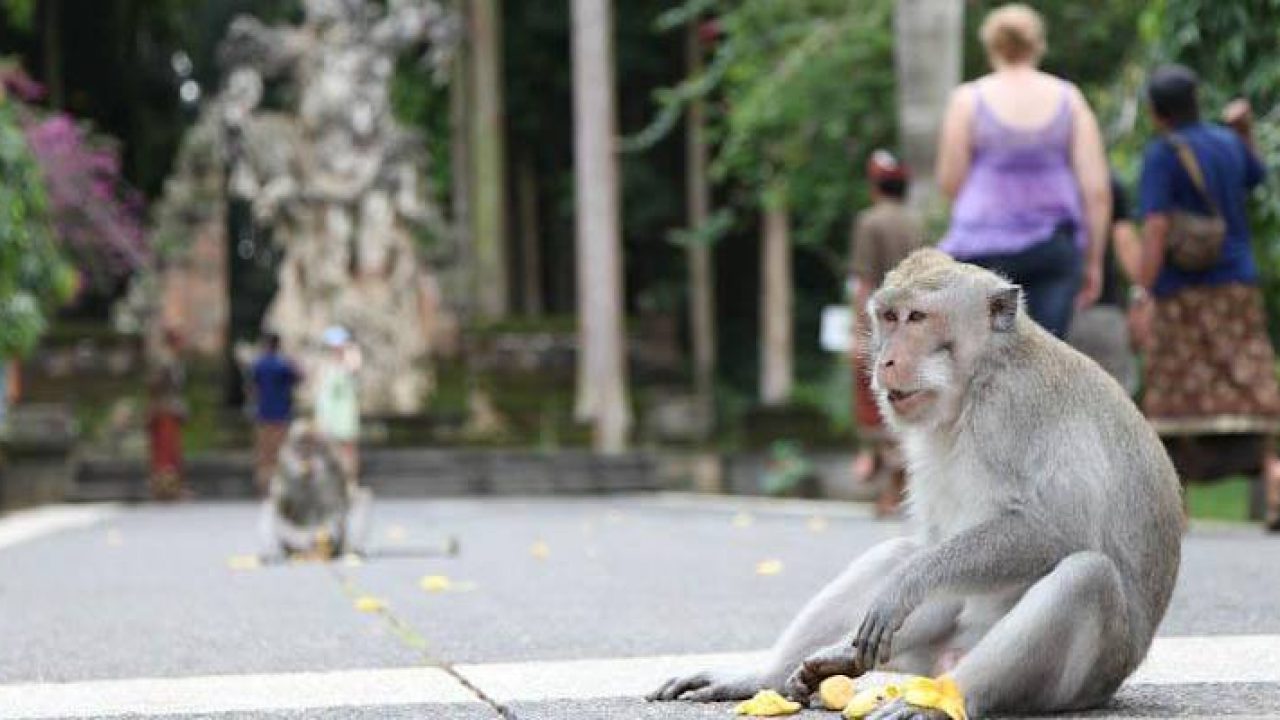Macaque monkeys at Bali’s Uluwatu Temple can identify expensive items to steal – and then ransom these purloined goodies for food of equal perceived value!
If you’ve had any run-ins with the long-tailed macaque monkeys that are found all over Southeast Asia, an in-depth study that was just published in the UK may not come as a big shock to you. But then again, it just might.
This particular species of monkey is well-known for their cheekiness and even aggression when things don’t go their way. The macaques at Kuala Lumpur’s Batu Caves, for instance, are quite infamous for their nasty dispositions and quick tempers, and the aggrieved males in particular will not hesitate to bare their fangs or even lunge at people.

In tourist-trampled Bali, Indonesia, though, the locals long ago capitalised on the island’s monkey populations as another attraction for visitors. In Ubud, the famed Monkey Forest (Mandala Suci Wenara Wara) is a small 10-hectare patch of forest with three temples and over 1,000 resident monkeys.
The macaques here are, for the most part, fairly laid-back – as far as this species goes, anyway – probably owing somewhat to the fact that staff feed them daily, and the immense number of people traipsing through the forest has resulted in the monkeys losing all fear of humans.

But in the island’s southernmost reaches, at Uluwatu Temple, the monkeys act rather differently. Over multiple visits, I’ve personally seen more than one incident involving a thieving monkey grabbing an inattentive tourist’s sunglasses, camera, or phone and bolting up to a high branch, seemingly mocking the victim, staying in plain sight. Temple staff have become well-versed in using food to coax the monkeys to return the purloined objects.
Turns out the monkey masterminds were paying close attention, and over time, they learned enough to turn it into a booming barter system – albeit one with theft as its core component. Now, a paper on this very phenomenon has been published, and the results are pretty eye-opening.
The paper, published in a Royal Society science journal as part of a theme issue titled ‘Existence and prevalence of economic behaviours among non-human primates’ and reported by CNN International, studied these very monkeys at Uluwatu Temple in Bali, who routinely steal items from humans – bags, hats, sunglasses, small cameras, phones, you name it – and then hold them to ransom in exchange for food.

Economics 101, Monkey-Style
But here’s the kicker: The study found adult wild long-tailed macaque monkeys were intelligent enough to comprehend which items had the highest value to the people from whom they were stolen. High value items, such as an electronic item, would only be released after the monkeys were given food they perceived to be of corresponding value.
In the paper, the scientists noted that the process they observed involved “economic decision-making [which] requires the cognitive ability (i.e., mental processes involving associative learning and memorization) to respond differently to differentially valued tokens by trying to maximize one’s payoff. We found evidence for such behavioural associations between value-based token possession and quantity or quality of food rewards rejected and accepted by sub-adult and adult monkeys (i.e., the most skilful and selective individuals) during the token/reward-bartering phase. They consistently and actively obtained either more food rewards or a more preferred food reward in exchange for a higher-valued token. They were also more likely to end a successful bartering interaction by accepting a less preferred food reward in exchange for a lower-valued token.”
The paper’s authors said the observed behavior displayed “unprecedented economic decision-making processes” among the monkeys observed as part of the study.
The scientists, from the University of Lethbridge in Canada, and Udayana University in Indonesia, observed that, as well as being able to “use objects as symbolic tools to request specific food rewards,” the ability of the monkeys to barter successfully increased with age and experience.
There were “clear behavioral associations between value-based token possession and quantity or quality of food rewards rejected and accepted by sub-adult and adult monkeys,” the authors said, with older monkeys “preferentially” selecting higher value items.
The paper, published on January 11, 2021, was based on research studies conducted over 273 days from 2015 to 2016, with further observations conducted in 2019.
Monkey Mafia
The scientists filmed the monkeys as they observed a visitor, then inconspicuously approached them, stole the desired object, and then stepped aside (often just out of reach), holding the object hostage as they waited for a suitable offering.

The adult monkeys insisted on accumulating “several food rewards before returning the token” in situations where the item was of high value, but as noted, were usually willing to accept a “less preferred food reward” in exchange for a lower value item, the authors said.
The paper’s abstract concluded, “This population-specific, prevalent, cross-generational, learned, and socially influenced practice may be the first example of a culturally maintained token economy in free-ranging animals.”
So now you know… when it comes to Uluwatu’s band of long-tailed thieves, these aren’t just your everyday monkeys. Far beyond being cheeky, they’re ambitious, intelligent, and who knows, perhaps one day bound for the lucrative financial services sector of the tropical forest community.
Watch the short BBC video clip below to see just how the ransom got paid.
"ExpatGo welcomes and encourages comments, input, and divergent opinions. However, we kindly request that you use suitable language in your comments, and refrain from any sort of personal attack, hate speech, or disparaging rhetoric. Comments not in line with this are subject to removal from the site. "

















